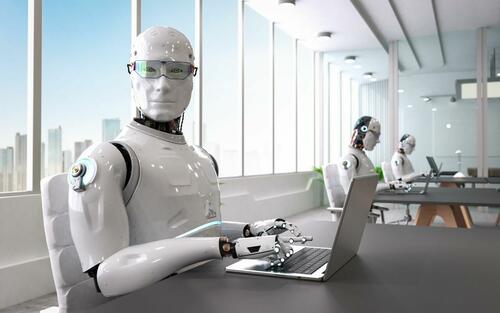
If there was ever a moment in history when globalists have been unable to contain their unsettling glee it was the moment that Artificial Intelligence became a focus of public discourse. It's clear that the World Economic Forum worships AI – Lavishing the technology with praise and describing it as the end-all-be-all of human industry. AI, they claim, will change the world so rapidly that most people will not be able to keep up with the advancements.
We have yet to see any of these advancements in the real world, of course. In fact, it's difficult to pinpoint any tangible benefits produced by AI so far other than making it easier for college kids to cheat on essays. And here is where we run into a disconnect between what the WEF predicts and what is most likely to happen according to the evidence.
Is AI really the do-it-all technology that globalists make it out to be? Is half of humanity going to be replaced with automation?
The establishment media has been building up this notion as an inevitability, with millions of people (mostly within Gen Z) now experiencing anxiety over the possibility that they will one day have no career options because of AI. The WEF even promotes a term for this feeling: FOBO (which apparently now means Fear Of Becoming Obsolete).
FOBO originally meant “fear of better options,” but the WEF has co-opted it and adjusted it for their AI narrative.
Automation is nothing new to first-world industries and adapting to it has not necessarily made anyone's place in the economy “obsolete.” The media tends to suggest that hands-on jobs in areas such as agriculture, manufacturing and retail are going the way of the Dodo soon. However, AI seems to represent a much greater threat to people in the white collar sector dealing with information tech. People in data collection, software development, web development, research analysis, information security, etc. are far more likely to be replaced by AI.
AI essentially automates data applications, making it possible for the average layman to one day “code” in a way that once took programmers years to learn. For example, web development is becoming so automated these days it will not be long before web designers are out of work.
AI has exhibited zero evidence of consciousness and creativity and has no capacity to operate widely in the physical world. The globalist answer to this problem is their suggestion that "data" is the new economy, and that eventually robots will handle the physical. This sounds like a pipe dream, but if the "data economy' is going to be the focus of AI for the foreseeable future, this means that if AI leads to a job apocalypse it will be primarily in the white collar world.
The WEF partially admits to this development in a recent paper on FOBO, in which they argue that around 44% of skill sets will become obsolete by 2027, and 42% of business related skill sets will be replaced by AI.
Far from becoming the all-knowing data-god hailed by WEF zealots like Yuval Harari, it appears much more likely that AI would simply augment or replace a number of office workers. For now, no significant advancements in medical science, space science, engineering, energy science, resource efficiency, mathematics, physics, etc. have been produced by AI. We're all waiting around for AI to blow past human science and nothing is happening. If all AI can do is put data programmers out of work, what good is it?
Interestingly, AI software makes some incredible claims very similar to the boasts of globalists. Here is what AI had to say about its plans for the world of human art:
“Imagine waking up one day and finding your job has been automated overnight by intelligent machines. Then you discover even the career you dreamed of pursuing next has already been mastered by AI.
Quickly, more and more human domains once thought impossible to replicate – art, music, emotion – fall prey to advancing algorithms until all uniquely human talent and purpose dwindles in the face of superior robotic counterparts. Soon your very existence becomes trivial … unnecessary.”
This is a fascinating omission bordering on delusion. Not the delusions of AI, but the delusions of whoever programmed the software to say this (and no, AI does not currently think for itself). AI art is generally considered generic and often terrible because it merely plagiarizes human art and then spits out an uninspired copy. The notion that a soulless algorithm will ever be able to create emotionally charged art, music, literature and more is naive.
It's not so much about what AI can actually do (which is very little), it's more about what the public is convinced that AI can do. Globalists argue that the “data economy” will replace all other functions of civilization and trade as AI takes over. But what good is data without application? The only application of such a system would be to manipulate or control popular perception. To make people believe things that are not true, to influence their behavior and to convince the public that they are no longer necessary.
This is where AI technology shines. It's not useful to industry, it does little to advance scientific discovery and it doesn't make the lives of individuals easier; rather it is only useful to the globalist agenda.
If there was ever a moment in history when globalists have been unable to contain their unsettling glee it was the moment that Artificial Intelligence became a focus of public discourse. It’s clear that the World Economic Forum worships AI – Lavishing the technology with praise and describing it as the end-all-be-all of human industry. AI, they claim, will change the world so rapidly that most people will not be able to keep up with the advancements.
We have yet to see any of these advancements in the real world, of course. In fact, it’s difficult to pinpoint any tangible benefits produced by AI so far other than making it easier for college kids to cheat on essays. And here is where we run into a disconnect between what the WEF predicts and what is most likely to happen according to the evidence.
Is AI really the do-it-all technology that globalists make it out to be? Is half of humanity going to be replaced with automation?
The establishment media has been building up this notion as an inevitability, with millions of people (mostly within Gen Z) now experiencing anxiety over the possibility that they will one day have no career options because of AI. The WEF even promotes a term for this feeling: FOBO (which apparently now means Fear Of Becoming Obsolete).
FOBO originally meant “fear of better options,” but the WEF has co-opted it and adjusted it for their AI narrative.
Automation is nothing new to first-world industries and adapting to it has not necessarily made anyone’s place in the economy “obsolete.” The media tends to suggest that hands-on jobs in areas such as agriculture, manufacturing and retail are going the way of the Dodo soon. However, AI seems to represent a much greater threat to people in the white collar sector dealing with information tech. People in data collection, software development, web development, research analysis, information security, etc. are far more likely to be replaced by AI.
AI essentially automates data applications, making it possible for the average layman to one day “code” in a way that once took programmers years to learn. For example, web development is becoming so automated these days it will not be long before web designers are out of work.
AI has exhibited zero evidence of consciousness and creativity and has no capacity to operate widely in the physical world. The globalist answer to this problem is their suggestion that “data” is the new economy, and that eventually robots will handle the physical. This sounds like a pipe dream, but if the “data economy’ is going to be the focus of AI for the foreseeable future, this means that if AI leads to a job apocalypse it will be primarily in the white collar world.
The WEF partially admits to this development in a recent paper on FOBO, in which they argue that around 44% of skill sets will become obsolete by 2027, and 42% of business related skill sets will be replaced by AI.
Far from becoming the all-knowing data-god hailed by WEF zealots like Yuval Harari, it appears much more likely that AI would simply augment or replace a number of office workers. For now, no significant advancements in medical science, space science, engineering, energy science, resource efficiency, mathematics, physics, etc. have been produced by AI. We’re all waiting around for AI to blow past human science and nothing is happening. If all AI can do is put data programmers out of work, what good is it?
Interestingly, AI software makes some incredible claims very similar to the boasts of globalists. Here is what AI had to say about its plans for the world of human art:
“Imagine waking up one day and finding your job has been automated overnight by intelligent machines. Then you discover even the career you dreamed of pursuing next has already been mastered by AI.
Quickly, more and more human domains once thought impossible to replicate – art, music, emotion – fall prey to advancing algorithms until all uniquely human talent and purpose dwindles in the face of superior robotic counterparts. Soon your very existence becomes trivial … unnecessary.”
This is a fascinating omission bordering on delusion. Not the delusions of AI, but the delusions of whoever programmed the software to say this (and no, AI does not currently think for itself). AI art is generally considered generic and often terrible because it merely plagiarizes human art and then spits out an uninspired copy. The notion that a soulless algorithm will ever be able to create emotionally charged art, music, literature and more is naive.
It’s not so much about what AI can actually do (which is very little), it’s more about what the public is convinced that AI can do. Globalists argue that the “data economy” will replace all other functions of civilization and trade as AI takes over. But what good is data without application? The only application of such a system would be to manipulate or control popular perception. To make people believe things that are not true, to influence their behavior and to convince the public that they are no longer necessary.
This is where AI technology shines. It’s not useful to industry, it does little to advance scientific discovery and it doesn’t make the lives of individuals easier; rather it is only useful to the globalist agenda.
Loading…





